My 2008 album begins in Utah and ends in (or near) hell. Whether you think the distance between the starting point and the destination is a lot of territory or not much, we do get to travel pretty far afield. There’s sunny California with the Botticellis, lovely inner-city Baltimore with DoMaJe, Iraq with the estimable Danny Elfman, and someplace sublimely absurd with Flight of the Conchords.
This is the third year for this approach to the year in music, and the rules are simple: I pick my favorite songs, with no previous winners allowed, and no more than one song from an artist. These constraints didn’t limit me much: Only one band got bonged for previous inclusion, and only Kathleen Edwards and the Gutter Twins would have gotten two selections without my dumb regulations.
The list was drawn from roughly 1,500 songs released in 2008 that I’ve consumed. I’ve heard Chinese Democracy (surprisingly decent, and surprisingly forgettable) and Death Magnetic (Metallica, get thee some discipline), and The Dark Knight soundtrack (amazingly well-matched with the movie, but dependent on it) and Gnarls Barkley (a disappointment), plus more than 100 other records. While this list is almost exclusively drawn from the “alternative” category – and is hence very, very white and mostly male – my interests and tastes aren’t (quite) that narrow. This is what I liked best.
This list started in the neighborhood of 25 songs and was winnowed down to make it an “album,” something that’s digestible and with an arc. The final product is 13 songs and 50 minutes long. All the songs are available for download from iTunes and Amazon.com.
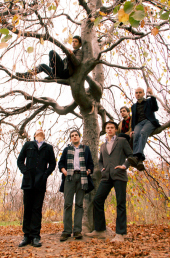 White Rabbits, “Beehive State.” A cryptic and clipped song seemingly about the wisdom of territorial expansion and federal aid – “Well we got to irrigate our deserts / Yeah, we got to get some things to grow / And we got to tell this country about Utah / ‘Cause nobody seems to know” – it builds dramatically without obvious purpose. Part of the Gigantic Singles Series, the song climaxes with ethereal keyboards imitating voices; martial drums; and a piano whose majestic theatricality would get Axl Rose off. It operates similarly to Neko Case’s indirect, fragmentary tales: It certainly sounds impressive and important, but good luck figuring out why.
White Rabbits, “Beehive State.” A cryptic and clipped song seemingly about the wisdom of territorial expansion and federal aid – “Well we got to irrigate our deserts / Yeah, we got to get some things to grow / And we got to tell this country about Utah / ‘Cause nobody seems to know” – it builds dramatically without obvious purpose. Part of the Gigantic Singles Series, the song climaxes with ethereal keyboards imitating voices; martial drums; and a piano whose majestic theatricality would get Axl Rose off. It operates similarly to Neko Case’s indirect, fragmentary tales: It certainly sounds impressive and important, but good luck figuring out why.
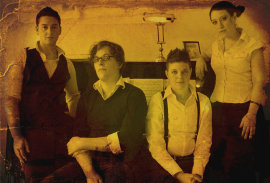 The Shondes, “I Watched the Temple Fall.” The only band I’ve heard that truly sounds like a worthy successor to Sleater-Kinney, the Brooklyn-based Shondes marry instrumental precision and invention with naked intensity and emotion. On the band’s debut record, The Red Sea, some of the resemblance stems from the vocal vibrato and interplay, and some of it comes from balance between beauty and rage, but it’s largely ineffable; there’s just a posture that resembles mid-period Sleater-Kiney (say, Dig Me Out). The trunk here is strong and propulsive – a primary vocal line, a bludgeoning bass offering a surprisingly muscular melody – but you’re likely to pay attention to all the digressive stuff branching off: The drums sound anxious with their emphases strangely misplaced, the violin falls away and twirls, and the backing vocals somehow overwhelm nearly everything else. Brutal yet lovely.
The Shondes, “I Watched the Temple Fall.” The only band I’ve heard that truly sounds like a worthy successor to Sleater-Kinney, the Brooklyn-based Shondes marry instrumental precision and invention with naked intensity and emotion. On the band’s debut record, The Red Sea, some of the resemblance stems from the vocal vibrato and interplay, and some of it comes from balance between beauty and rage, but it’s largely ineffable; there’s just a posture that resembles mid-period Sleater-Kiney (say, Dig Me Out). The trunk here is strong and propulsive – a primary vocal line, a bludgeoning bass offering a surprisingly muscular melody – but you’re likely to pay attention to all the digressive stuff branching off: The drums sound anxious with their emphases strangely misplaced, the violin falls away and twirls, and the backing vocals somehow overwhelm nearly everything else. Brutal yet lovely.
 The Dodos, “Fools.” I’m lazy, so here’s what I wrote about this song prior to the drum-and-guitar duo’s July show at Huckleberry’s: Visiter’s “fourth track, ‘Fools,’ is a calling card. Light, nearly ecstatic calls in the chorus, impatient percussion and acoustic guitar, spastic but muted bursts of distorted guitars, a low hum of strings – the conviction and confidence of the execution carries the listener to the Dodos’ strange place.” That plays up the track’s strangeness, but this is glorious pop that makes its oddities comfortable and comforting. Download: http://downloads.pitchforkmedia.com/Dodos%20-%20Fools.mp3.
The Dodos, “Fools.” I’m lazy, so here’s what I wrote about this song prior to the drum-and-guitar duo’s July show at Huckleberry’s: Visiter’s “fourth track, ‘Fools,’ is a calling card. Light, nearly ecstatic calls in the chorus, impatient percussion and acoustic guitar, spastic but muted bursts of distorted guitars, a low hum of strings – the conviction and confidence of the execution carries the listener to the Dodos’ strange place.” That plays up the track’s strangeness, but this is glorious pop that makes its oddities comfortable and comforting. Download: http://downloads.pitchforkmedia.com/Dodos%20-%20Fools.mp3.
 The Botticellis, “Flashlight.” I can’t think of another album title that so accurately reflected the tone of a record. The Botticellis’ Old Home Movies promises warm, faded nostalgia that the songs deliver, and “Flashlight” is just waiting for inclusion in a Wes Anderson movie. A sing-song lullaby – your head and shoulders cannot help but slide from side to side – the song’s lush, dreamy instrumentation recalls ’60s pop, but it’s Alexi Glickman’s appropriately sweet singing that nails it. Wobbly organ and an acoustic guitar take the lead, but there’s a cavernous backdrop of drums, strings, and mandolin to flesh it out.
The Botticellis, “Flashlight.” I can’t think of another album title that so accurately reflected the tone of a record. The Botticellis’ Old Home Movies promises warm, faded nostalgia that the songs deliver, and “Flashlight” is just waiting for inclusion in a Wes Anderson movie. A sing-song lullaby – your head and shoulders cannot help but slide from side to side – the song’s lush, dreamy instrumentation recalls ’60s pop, but it’s Alexi Glickman’s appropriately sweet singing that nails it. Wobbly organ and an acoustic guitar take the lead, but there’s a cavernous backdrop of drums, strings, and mandolin to flesh it out.
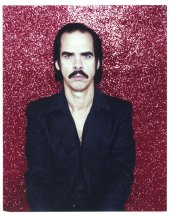 Nick Cave and the Bad Seeds, “Midnight Man.” Nick Cave has for decades alternated between being a glum balladeer and an angry rock-and-roller, but he’s rarely sought (let alone found) a satisfying middle ground. Here it is. The hum of an organ grows to an agitated buzz, and an orchestra of processed, high-pitched guitars explodes into a jagged solo, while Cave grooves and sounds as if he’s having more fun than he has in years; you can almost hear him dancing. Firmly middle-aged – Cave turned 50 last year – his always impressive talents seemed to mature on Dig!!! Lazarus Dig!!!
Nick Cave and the Bad Seeds, “Midnight Man.” Nick Cave has for decades alternated between being a glum balladeer and an angry rock-and-roller, but he’s rarely sought (let alone found) a satisfying middle ground. Here it is. The hum of an organ grows to an agitated buzz, and an orchestra of processed, high-pitched guitars explodes into a jagged solo, while Cave grooves and sounds as if he’s having more fun than he has in years; you can almost hear him dancing. Firmly middle-aged – Cave turned 50 last year – his always impressive talents seemed to mature on Dig!!! Lazarus Dig!!!
DoMaJe, “Way Down in the Hole.” The theme for The Wire’s fourth season back in 2006, DoMaJe’s take on Tom Waits’ song was officially released this year on“… And All the Pieces Matter”: Five Years of Music from The Wire, and there’s no doubt that the track is informed by David Simon’s exquisitely grim portrait of Baltimore life, particularly that year’s focus on city schools. But the song stands on its own, too: The vocal innocence of the youthful singers of DoMaJe is offset by Waits’ wizened words about temptation.
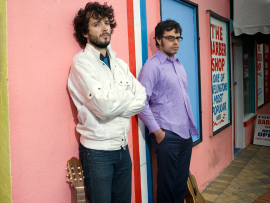 Flight of the Conchords, “Hiphopopotamus Vs. Rhymenocerous.” Yes, it’s a New Zealand novelty folk duo, but the comedy doesn’t come at the expense of the music. Some of the whitest hip hop you’ll ever hear, “Hiphopopotamus Vs. Rhymenoceros” – from the group’s self-titled debut, drawn from the first season of its HBO show – has more cleverness in two minutes than most episodes of Saturday Night Live. “They call me the Hiphopopotamus / My lyrics are bottomless … .” Deep breath. Pause. Throat clearing. Guitar noodling. And then there’s margarine porn, polite raps, self-improvement, “preposterous hypothesis,” “perchance,” and “Nanna’s tea party,” all done with gleeful cluelessness and vocal dexterity.
Flight of the Conchords, “Hiphopopotamus Vs. Rhymenocerous.” Yes, it’s a New Zealand novelty folk duo, but the comedy doesn’t come at the expense of the music. Some of the whitest hip hop you’ll ever hear, “Hiphopopotamus Vs. Rhymenoceros” – from the group’s self-titled debut, drawn from the first season of its HBO show – has more cleverness in two minutes than most episodes of Saturday Night Live. “They call me the Hiphopopotamus / My lyrics are bottomless … .” Deep breath. Pause. Throat clearing. Guitar noodling. And then there’s margarine porn, polite raps, self-improvement, “preposterous hypothesis,” “perchance,” and “Nanna’s tea party,” all done with gleeful cluelessness and vocal dexterity.
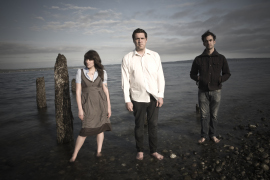 Damien Jurado, “Trials.” From Caught in the Trees, “Trials” has a
Damien Jurado, “Trials.” From Caught in the Trees, “Trials” has a
delicate, lovely texture that masks its true nature. Musically, it works as a cleaned-up version of Elliott Smith’s “Needle in the Hay.” What elevates it from feeling like a knock-off is the level of detail, particularly the accents to the side: the backing vocals, the electric guitar, all serving to emphasize the softness and fragility of Jurado’s singing. Listen to the lyrics, though, and the palette becomes more complex, with an undoubtedly bitter aftertaste: “Please give him a call / I want you to see / That love isn’t real / And your heart doesn’t bleed / You can come back / When they let you down.”
 Kathleen Edwards, “Scared at Night.” On each of her three records, Kathleen Edwards has delivered at least one song that seems to snatch life from the world and turn it into music. It’s not necessarily ordinary life, and it’s not something as simple as lyrics. These songs are genuinely honest and unvarnished and seem alive in every moment; this woman might poop truth. Asking for Flowers has two such songs, and while “Run” has my favorite musical moment of the year – a catch of the voice in a late chorus – “Scared at Night” is my favorite song of the year. (And I had a pretty good idea that would be the case the first time I heard it in March.) You’d never imagine that something with the words “You’d blown out his eye / And you could see his brain.” could be so sensitive and beautiful. Two lives and a relationship are distilled into three expertly written episodes, and sung in a way that breaks your heart and somehow cheers you up just a little bit. I want to die to this.
Kathleen Edwards, “Scared at Night.” On each of her three records, Kathleen Edwards has delivered at least one song that seems to snatch life from the world and turn it into music. It’s not necessarily ordinary life, and it’s not something as simple as lyrics. These songs are genuinely honest and unvarnished and seem alive in every moment; this woman might poop truth. Asking for Flowers has two such songs, and while “Run” has my favorite musical moment of the year – a catch of the voice in a late chorus – “Scared at Night” is my favorite song of the year. (And I had a pretty good idea that would be the case the first time I heard it in March.) You’d never imagine that something with the words “You’d blown out his eye / And you could see his brain.” could be so sensitive and beautiful. Two lives and a relationship are distilled into three expertly written episodes, and sung in a way that breaks your heart and somehow cheers you up just a little bit. I want to die to this.
 The Hold Steady, “One for the Cutters.” I do not like the Hold Steady. Despite all the praise thrown the band’s way for its breakthrough, Boys and Girls in America, and this year’s follow-up, Stay Positive, I’ve never found much to enjoy or appreciate. It’s always played false to me, like Springsteen trying really hard to be Springsteen, as if the band thinks it’s the disaffected voice of a generation. What’s different here? A harpsichord intro and outro, an elusive point of view, and a tension – related to that slippery POV – between the vague and the specific, between clich – and insight, between observant, detailed poetry and lazy language (“They parade every townie in town through the station”). One theme in this murder ballad is perception and ignorance – that which we cannot know, the mystery of what really happened – and part of it is clinical police-report detail. Yeah, it’s still pretty pompous, but that’s okay when you earn it. My second favorite song of the year.
The Hold Steady, “One for the Cutters.” I do not like the Hold Steady. Despite all the praise thrown the band’s way for its breakthrough, Boys and Girls in America, and this year’s follow-up, Stay Positive, I’ve never found much to enjoy or appreciate. It’s always played false to me, like Springsteen trying really hard to be Springsteen, as if the band thinks it’s the disaffected voice of a generation. What’s different here? A harpsichord intro and outro, an elusive point of view, and a tension – related to that slippery POV – between the vague and the specific, between clich – and insight, between observant, detailed poetry and lazy language (“They parade every townie in town through the station”). One theme in this murder ballad is perception and ignorance – that which we cannot know, the mystery of what really happened – and part of it is clinical police-report detail. Yeah, it’s still pretty pompous, but that’s okay when you earn it. My second favorite song of the year.
 Danny Elfman, “S.O.P. Theme #1.” A palette cleanser from Standard Operating Procedure, the Errol Morris documentary about the infamous Abu Ghraib photographs. Elfman emulates Philip Glass’ hypnotic repetition but here, in six minutes, covers expansive emotional terrain. You can almost hear in this lovely, dreamily urgent piece a wide range of ordinary human possibility – potential mildly heroic and deeply shameful, what happens when you put folks in a situation that defies experience and everyday morality. There’s a tenuous hope in the piano, winds, and bells, while the brass and strings anchor the piece in darker terrain. The music is essential to the movie, setting a deliberate, measured, inquisitive, and saddened tone and circumventing outrage. I’d have preferred an angrier film, but Elman’s music is a good match for the one Morris made.
Danny Elfman, “S.O.P. Theme #1.” A palette cleanser from Standard Operating Procedure, the Errol Morris documentary about the infamous Abu Ghraib photographs. Elfman emulates Philip Glass’ hypnotic repetition but here, in six minutes, covers expansive emotional terrain. You can almost hear in this lovely, dreamily urgent piece a wide range of ordinary human possibility – potential mildly heroic and deeply shameful, what happens when you put folks in a situation that defies experience and everyday morality. There’s a tenuous hope in the piano, winds, and bells, while the brass and strings anchor the piece in darker terrain. The music is essential to the movie, setting a deliberate, measured, inquisitive, and saddened tone and circumventing outrage. I’d have preferred an angrier film, but Elman’s music is a good match for the one Morris made.
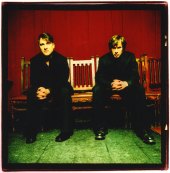 The Gutter Twins, “All Misery/Flowers.” This pairing of Mark Lanegan (Screaming Trees, Queens of the Stone Age) and Greg Dulli (Afghan Whigs) has been a long time coming – Lanegan has played with Dulli’s Twilight Singers since 2003 – and Saturnalia works better than I expected and as well as I’d hoped. Lanegan and Dulli are singular talents, and they don’t seem a natural match, but they turned out to be wonderfully complementary with their duties evenly divided. Lanegan’s rich, expressive, off-balance croak takes the lead here, augmented by Dulli’s voice and his gift for haunted, haunting rock arrangement. A tortured document of solitude and a plea for salvation, Lanegan’s increasingly intense singing sounds like he’s slowly roasting in hell – “Little girls might twitch / At the way I twitch / But the way I burn / It’s a son of a bitch.” The musical setting is in many ways unremarkable – a big-drum intro, a piano lead, the building accompaniment of electric guitars, including a moaning/squealing effect – but the arrangement is alchemic and classic.
The Gutter Twins, “All Misery/Flowers.” This pairing of Mark Lanegan (Screaming Trees, Queens of the Stone Age) and Greg Dulli (Afghan Whigs) has been a long time coming – Lanegan has played with Dulli’s Twilight Singers since 2003 – and Saturnalia works better than I expected and as well as I’d hoped. Lanegan and Dulli are singular talents, and they don’t seem a natural match, but they turned out to be wonderfully complementary with their duties evenly divided. Lanegan’s rich, expressive, off-balance croak takes the lead here, augmented by Dulli’s voice and his gift for haunted, haunting rock arrangement. A tortured document of solitude and a plea for salvation, Lanegan’s increasingly intense singing sounds like he’s slowly roasting in hell – “Little girls might twitch / At the way I twitch / But the way I burn / It’s a son of a bitch.” The musical setting is in many ways unremarkable – a big-drum intro, a piano lead, the building accompaniment of electric guitars, including a moaning/squealing effect – but the arrangement is alchemic and classic.
 O’Death, “Vacant Moan.” Thrashy, high-energy bluegrass from Broken Hymns, Limbs, and Skin that rocks harder than most metal, particularly in the chorus. O’Death – which accurately describes itself as “gothic/country/punk” on its MySpace page – here follows the soft-loud-soft dynamic model epitomized by the Pixies, with twang and a sawing fiddle replacing the screams and electric guitars. I can’t understand most of the lyrics – sung in an aggressive, pinched whine – but the mood is frenzied, with galloping bass and drums, and it sounds like a mad dash from a fleet-footed Satan. Each verse has a slightly different sonic emphasis – a percussive whoosh-whoosh in one, massive drums on another – but the show here is its undeniable chorus, with its grim phrase “vacant moan” nearly as evocative as the famous “cellar door.”
O’Death, “Vacant Moan.” Thrashy, high-energy bluegrass from Broken Hymns, Limbs, and Skin that rocks harder than most metal, particularly in the chorus. O’Death – which accurately describes itself as “gothic/country/punk” on its MySpace page – here follows the soft-loud-soft dynamic model epitomized by the Pixies, with twang and a sawing fiddle replacing the screams and electric guitars. I can’t understand most of the lyrics – sung in an aggressive, pinched whine – but the mood is frenzied, with galloping bass and drums, and it sounds like a mad dash from a fleet-footed Satan. Each verse has a slightly different sonic emphasis – a percussive whoosh-whoosh in one, massive drums on another – but the show here is its undeniable chorus, with its grim phrase “vacant moan” nearly as evocative as the famous “cellar door.”
(This article originally appeared in the River Cities’ Reader.)

